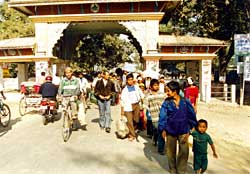 The number of Nepali women migrating to India for security and employment is growing with the intensity of the conflict in the mid-western hills.
The number of Nepali women migrating to India for security and employment is growing with the intensity of the conflict in the mid-western hills. Women, many carrying children, thronged the Nepal-India border at Rupediya. When interviewed, many say they were forced to leave their homes due to Maoist activities and search operations by the security forces.
Dhan Maya BK has come a long way from Badagaun village of Salyan district. Clutching her two-year old baby on her back, she is now on the way to Simla to join her husband where he has been working for the last two years.
"Unless peace returns to my home village, I will probably settle down there, that is if the Indians allow us to," Dhan Maya says. Her elderly parents-in-law are the only members of the family still left in Badagaun. Other villagers and relatives have all left.
"It's better to stay in India than to go through all the uncertainty and misery in my village," says 45-year-old Bhim Kumari Buda from Kalwang of Rolpa, who is crossing the border to join her husband and son in New Delhi.
Traditionally, men have migrated from Nepal's food-deficit mid-hills to India for seasonal employment. Once the war started, the exodus of young men grew. Now older men and women are also leaving with children.
Many teenagers are fleeing, fearing Maoist conscription and harassment by the security forces. Radha Pariyar is 12 years old and says she fled Surkhet with her brothers because she was afraid the Maoists would take her. "At least in India I will be safe and can send money back to my parents," says Radha.
DSP Ram Bahadur Thapa, who mans the border post in Rupediya, confirms that the numbers of Nepali women crossing over has increased since the end of ceasefire last August. On an average, he says he counts at least 10 women every day traveling with children and all their belongings to India. Thapa's records show that in just two months, more than 600 women aged 10-60 years have left Nepal at Nepalganj.
Most women say they are leaving because they are harassed by both the Maoists and the army to reveal the whereabouts of their husbands and sons. They can't take it anymore, and neither, it seems, can the country survive this hemorrhage. (Mahila Bolchin)


